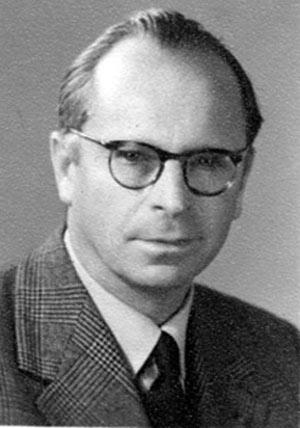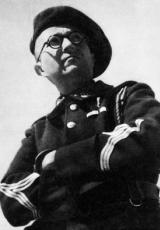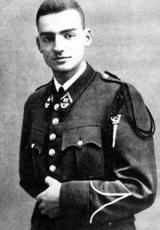Jean Rosenthal

Jean Rosenthal was born on 5 September 1906 in Paris' first arrondissement. His father was a gem dealer. He took his secondary education at the Ecole Alsacienne, sat the baccalaureate and obtained a law degree.
In October 1925, he was drafted early into the 1st Group of Aeronautical Workers. Appointed to corporal in June 1926, then sergeant in November, he was released in May 1927.
He then worked with his father at the jeweller’s before setting up on his own in 1935.
Called up in September 1939 as a reserve lieutenant, Jean Rosenthal was assigned to the 8th Air Wing. Demobilised in July 1940, he moved into his family home in Megève.
In December 1942, he decided to escape from France via Spain. He was arrested and jailed for a couple of weeks in Pamplona prison then he made his way via Madrid and Lisbon, finally reaching England on 23 January 1943.
Appointed to lieutenant of the L Force in February 1943, he was sent to Cairo via Freetown and Lagos. He made it to Tripoli and the forces of General Leclerc on 25 March 1943. A tank lieutenant, he was sent on mission to London by General Leclerc in July 1943.
On 1 September 1943, he was incorporated into the Central Bureau of Intelligence and Operations, commonly referred to as the BCRA, and after a short instruction programme, signed up as a volunteer for a mission in occupied France.
During the night of 21-22 September 1943, as part of the "Musc" mission, he was air dropped into the Junot field at the crossroads of the Departments of Rhône, Ain and Saône-et-Loire with the British colonel Richard Heslop (codename "Xavier") of the Special Operations Executive (SOE). Their mission consisted of evaluating the situation of the maquis in Haute-Savoie, their needs in terms of armaments and supplies, the size of their numbers and level of training. They took a tour of the maquis during which time Captain Jean Rosenthal, under the name Cantinier, installed a radio in Megève's gendarmerie.
After being flown back to London on the night of 16-17 October to report back directly to General de Gaulle, Cantinier was immediately entrusted with a second mission. He was now a delegate of Free France and landed in the Jura, in the “Orion” field, near Bletterans, during the night of 18-19 October, with Xavier, the American radio captain Denis O. Johnson, known as Paul, and Elizabeth Reynolds, a courier. Under cover he set up camp in Haute-Savoie. One notable member of his team was his cousin, Micheline Rosenthal, known as Michette, aged 16, who became a courier.
When in the company of the politician Maurice Bourgès-Maunoury, he met the politician Chaban-Delmas and more importantly, before the deployment of the FFI (French Forces of the Interior), he negotiated a deal with the FTP Free Shooters and Partisans). In Paris, he met their leader, Charles Tillon, and a gentleman's agreement was concluded. Cantinier was going to be able to dedicate himself to the large-scale manoeuvres in Les Glières.
In early 1944, liaising with the leaders of the various maquis, he led perilous missions, including notably the delicate sabotage operation conducted at the Schmidt-Ross ball-bearing factory in Annecy, which stopped production at the plant for several months. In February he also organised several parachute drops into the maquis in Les Glières.
On 9 March 1944 he was part of the expedition against the GMR’s headquarters in Entremont during which Tom Morel was killed and, after the order to withdraw given to the maquis on 26 March 1944, he started to prepare for the liberation of Haute-Savoie.
On 3 May, 1944, Jean Rosenthal returned to London to get his orders and was sent back to France for yet another mission. He parachuted in on the night of 7-8 June 1944, landing in Cluny in Saône-et-Loire, along with Maurice Bourgès-Maunoury and Paul Rivière, to assure the liaison between the maquis and the interallied chiefs of staff.
In August 1944, under his command, the maquis leaders in Haute-Savoir liberated the Department, capturing 3,000 prisoners and a big haul of military equipment. On 19 August 1944, he received the surrender of the German forces under the command of General Oberg at the Prefecture of Haute-Savoie, in the company of the Regional FFI Leader Nizier.
In October 1944, Jean Rosenthal was transferred to the General Directorate of Studies and Research (DGER) in Paris where he voluntarily enlisted to serve in the Far East against the Japanese. He left London in April 1945 for Calcutta where he was appointed deputy base chief. Promoted to the rank of battalion chief, he planned the airdrops and obtained brilliant results for his teams of parachutists. After several returns to Paris, he moved back permanently in March 1946 and was demobilised two months later.
From that point on, Jean Rosenthal resumed the work he did prior to the outbreak of war, trading precious stones. He was named President of the World Jewellery Confederation.
An honorary colonel, he also assumed important responsibilities within the Jewish community, as President of the CRIF (Representative Council of Jewish Institutions in France) and the AUJF (Unified Association of Jews in France).
Jean Rosenthal died on 2 August 1993 in Garaches (Hauts-de-Seine). He is buried at Montparnasse Cemetery in Paris.
- Grand Officer of the Legion of Honour [list]Companion of the Liberation – Decree of 20 November 1944
- Croix de Guerre, 39-45 (six commendations)
- Colonial Medal
- Military Cross (GB)




